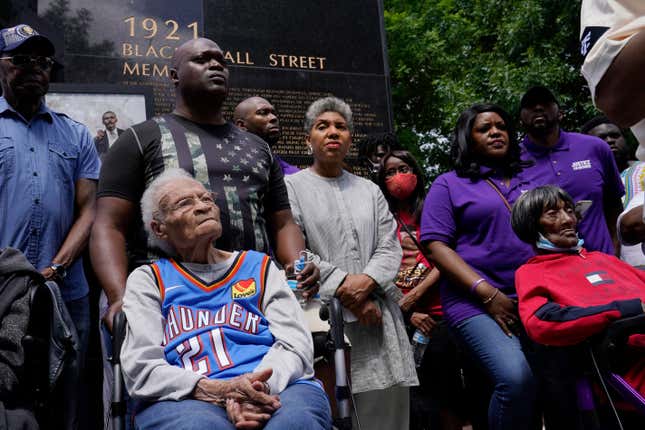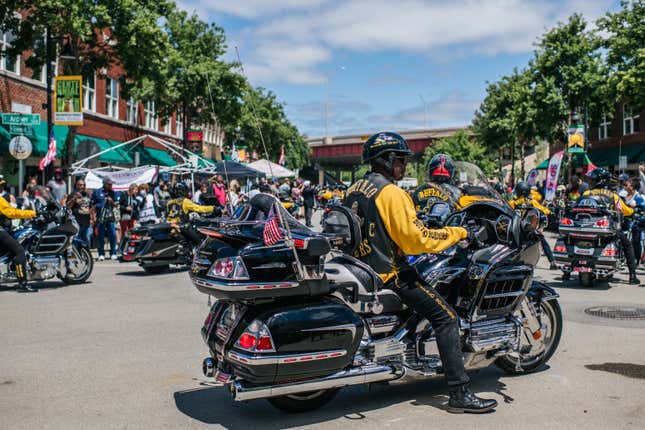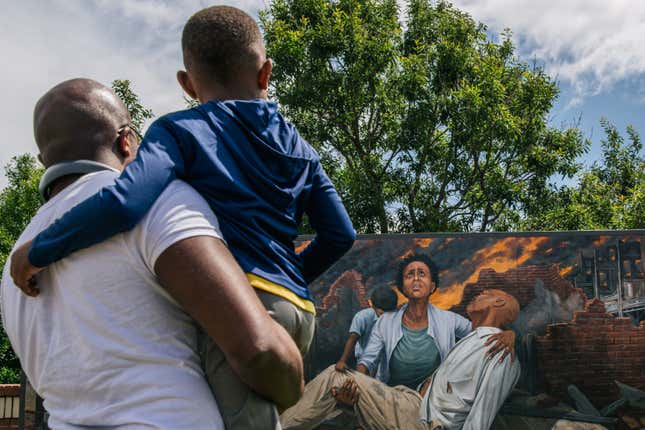
On September 16, 2016, Dr. Tiffany Crutcher suffered an unspeakable loss that would forever change not only the course of her life but that of an entire city.
While on her way to respond to a domestic dispute, Tulsa, Okla., police officer Betty Shelby spotted an abandoned vehicle in the middle of the road. It belonged to Terence Crutcher, Tiffany’s twin brother. And in what has become all too familiar when it comes to police encounters in “post-racial America,” the end result was the gruesome murder of yet another unarmed Black man in broad daylight.
In the time since that fateful day, Shelby was charged with manslaughter, only to be absolved of her crime and granted carte blanche to further harm her community as a sheriff’s deputy. Tiffany, however, has poured her pain into founding a non-profit organization that bears her brother’s name in hopes of one day ending the cycle of violence that has haunted Tulsa’s Black community for over a century.
That passion for her people most recently manifested in the form of the Black Wall Street Legacy Festival, a three-day Blackstavaganza that centered the survivors and descendants of the infamous Tulsa Race Massacre of 1921 and featured contributions from both local and national talent, organizers, and activists who all shared three common goals: a commitment to spreading the truth about the massacre, a desire to inspire hope amongst our people, and a pledge to empower future generations to learn and ground themselves in the story from which they came.
So on the 100th anniversary of the Tulsa Race Massacre, Dr. Crutcher spoke with The Root to discuss her work within the community and her quest to achieve justice—for her brother, for the survivors and descendants of the massacre, and for anyone else who has been wrong by the reign of white supremacy—and what true racial reconciliation would entail.
As to what led her on this path, Dr. Crutcher revealed that she, too, is a descendant of a survivor of the Tulsa Race Massacre and that she drew inspiration from the work of Equal Justice Initiative founder Bryan Stevenson, who erected the National Memorial for Peace and Justice in Montgomery, Ala., as well as the separately housed Legacy Museum: From Slavery to Mass Incarceration.
“Never in a million years would I have thought that I would be engaged in that same work having a background in health care,” she told The Root.
Fate, however, had other plans.
“After my twin brother was killed by the police in 2016 here in Tulsa, I was thrust into this fight for justice,” she said. “I made a declaration that I would never let people forget what this city did to my twin brother and that I would honor his legacy and his name.”
That honor has taken the form of the Terence Crutcher Foundation, which has continued that journey to justice through a myriad and of programs and initiatives that engage the community, legislators, and law enforcement in order to identity and address inequity in not only Tulsa, but throughout the rest of the country.
“As we started to encroach on the 100th anniversary of the massacre, I saw the parallels of the past and the present,” Dr. Crutcher said. “The racial terror violence that my great-grandmother had to endure and flee in fear of her life is the same racial terror and state-sanctioned violence that Terence had to endure.”
She continued, “Thinking about my great-grandmother and her stories and how I didn’t get the opportunity to learn about it in school because of the erasure of our lives, our experiences, our accomplishments were crushed to the Earth. I want to right that wrong. I want my nieces and nephews to learn about what happened because it wasn’t until I went off to college that I learned about this history.”
The Black Wall Street Legacy Festival, which took place from May 28-30 and will continue on through June 19, was the culmination of not only her frustration with the status quo, but her refusal to be at the mercy of politicians with their own agendas.
“I started to have questions,” Dr. Crutcher said. “I started to observe and witness the makeup of a commission that had white politicians who didn’t have a track record of doing right by Black and Brown people in this city; white politicians who won’t utter the words Black Lives Matter; white politicians who have done nothing to ensure that what happened to Terence never happens again; white politicians who don’t believe in reparations. And that’s when I decided that we need to get involved. The community was saying, “Hey, we want to get involved, we want to control our history. We want to control our legacies.’ So we decided to do just that.
The Legacy Festival was no small feat. It required all types of permits, featured panels and discussions addressing everything from racial trauma to music’s role in resistance, consisted of marches, a soil collection ceremony, and private luncheons that centered the survivors and descendants of the massacre, as well as performances on two different stages from everyone from Grammy award-winning artist PJ Morton to hometown hero Playya 1000.

Yet despite its massive scope and ambition, it received minimal support from the city of Tulsa.
“The first African-American chairwoman of the Tulsa City Council, Vanessa Hall-Harper, was within 100 percent support of our events,” Dr. Crutcher said. “We had city councilors at our events. But as a whole, this was truly a community-led series of events led by a coalition of people from our own community; community organizations and people who have been left behind for far too long. [But] as far as an investment from the city as a whole, financially, we had zero support.”
She also expressed her concerns about the rampant gentrification in the once-thriving Black neighborhood known as the historic Greenwood district, which has gone from Black-owned banks, libraries and grocery stores to being replaced by the Oneok Field baseball park in the aftermath of the massacre. It’s quite literally one of the most egregious examples of gentrification in the entire country and a brazen attempt to erase Tulsa’s sins of the past.
“We don’t own anything in this district at all,” Dr. Crutcher said. “We lease space, but we own nothing. You see the gentrification. You see the highway, you see the ballpark. You see all of the gentrification in this community and you can just open your eyes and see that we live in a tale of two cities.”
Those two cities she alludes to are reinforced by murals and other works of art that are sprinkled throughout the Greenwood district and pay tribute to the massacre, but ignore it entirely when it comes to taking actual responsibility for what transpired in the form of equitable treatment and reparations.

“They’re just symbolic gestures, but nothing tangible,” Dr. Crutcher said. “I believe that these symbols are important and that they educate people on what took place because again, I didn’t learn about it. But that’s just not enough. It’s not enough at all.”
She continued, “What action steps are we going to take to atone for what happened? How are we going to heal and repair the damage that was done this century or decades of damage and trauma that we’ve had to endure? How are you going to atone for the generational wealth that was lost?”
So until that debt is paid in full to Tulsa’s Black community, Dr. Crutcher lives by a simple mantra: Tulsa owes.
“I’ve heard from [Tulsa’s mayor G.T. Bynum] that he doesn’t believe that people who weren’t living at the time should have to pay for what happened 100 years ago, when he has benefited from what happened,” she said. “He’s benefited from the death and the looting and the killing [of our people]. That mindset has to shift and we have to keep demanding what’s due to us. Tulsa owes.”
And she points to the Legacy Festival as not only a declaration of Black pride, but a call to action.
“I think we’re closer than we’ve ever been [to racial reconciliation] because of the power of the people,” she said. “I think we’ve empowered the citizens of Tulsa, the Black community, to realize the power that we possess collectively. To be honest, this wasn’t a symbolic gesture. It wasn’t about festivals. It wasn’t about concerts. This was our rallying cry. We centered the survivors for a reason. It was about people and there was a purpose behind it. And that call to action was one for reparations.”
Last week, the Tulsa City Council proposed a resolution that will “create short- and long-term recommendations to make significant progress toward restoring economic mobility, prosperity, and generational wealth for the 1921 Race Massacre survivors, their descendants, and residents of North Tulsa.” But until justice is served and our people are truly free, the fight continues. And in Tulsa, trust and believe that Dr. Crutcher is one of many who will help lead the charge.
To learn more about the Terence Crutcher Foundation, and how you can donate, volunteer, or otherwise lend your support to their cause, visit their website here.

